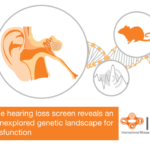The first results from an IMPC study of hearing loss in laboratory mice has revealed novel genes related to hearing loss that will help unravel the complex genetics of this common condition. These new insights will help identify new therapeutic targets that may lead to the development of new treatments.
To read the research, click here
To see the data, click here.
There are currently around 360 million people worldwide suffering from some form of hearing impairment. It is especially a problem for the elderly with 43% of people over the age of 65 suffering from some degree of hearing impairment. As the population ages it is imperative that we improve our understanding of hearing impairment.
Hearing loss is known to be very complex. For about half of sufferers there is a genetic component which can be broken up in to two distinct groups: Syndromic, which account for 70% of conditions, and non-syndromic, which account for 30%. In syndromic conditions, patients have hearing loss in isolation, with no other symptoms. So far about two thirds of all the genes associated with this type have been identified. In syndromic conditions, hearing loss is accompanied by other symptoms as part of a wider condition. To date there are 400 known syndromes that include hearing loss but the vast majority of genes underlying these syndromes are still unknown.
It is clear that we are far from a complete understanding of the genetics of hearing or even how many genes are involved. This creates a significant roadblock to identifying therapeutic targets for potential treatments. This study led by MRC Harwell as part of the International Mouse Phenotyping Consortium (IMPC) aims to address this. The IMPC is a global collaboration between scientists all over the world to decipher the function of every gene in the mouse genome (some 20,000 genes) – 98% of which are shared with humans.
The IMPC has to date created almost 5000 ‘mutant’ lines of mice, each with a single gene turned off. In this study, the scientists analysed the data from hearing tests of the mice, a similar test is also done in humans. Looking at 3,006 of these mouse lines they found that 67 had some degree of hearing loss. Importantly, 52 of these were not previously known. This represents a significant leap forward in our understanding of the genetics of deafness. Further study of these 52 genes will help us understand the mechanisms of hearing loss.
The IMPC has so far screened just 15% of the mammalian genome, this leaves a large proportion of the genome still to be analysed – an exciting wealth of unexplored data. The proportion of hearing loss genes discovered so far suggest that there are still around 450 left to discover.
“This study not only increases our knowledge of the many genes and molecular mechanisms required for hearing, but also provides a shortlist of new genes to investigate to discover the genetic basis of many human hearing loss syndromes,” reflects Professor Steve Brown, senior author on the paper and Director of MRC Harwell. “Importantly, testing of these genes in people with hearing loss may help to improve diagnosis and counselling of patients.”
Dr Michael Bowl, first author on the paper from the MRC Harwell Institute, said: “Mouse genetics has played an important role in our understanding of the development and functioning of the mammalian auditory system. Importantly, the International Mouse Phenotyping Consortium will continue to screen new mutants for hearing loss, and therefore we can expect the list of novel genes to grow further over the coming years.
Publication
To read the research in Nature Communications, click here.

